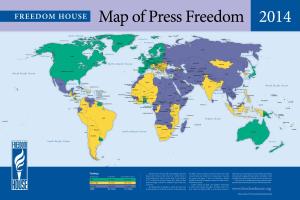Freedom of the press is at the lowest level in a decade and only one in seven people live in a country with a free press. Freedom House today released its annual survey and the results are not all that positive. (Jamaicans, however, have reason to celebrate, as the Caribbean nation continues to enjoy the “Free” press ranking.)
Middle Eastern and North African nations, Turkey, the Ukraine and the U.S.’s deteriorating media environment contributed to the decline in freedom, according to Freedom House. (The eight worst countries are: Belarus, Cuba, Equatorial Guinea, Eritrea, Iran, North Korea, Turkmenistan, and Uzbekistan.) In total, only 14 per cent of people across the world enjoy the benefits of a completely free press. Freedom House measures this by tracking how much political coverage the media produces, how safe journalists are, how much “legal and economic” red tape media houses deal with and how much the government interferes with the media. From the report:
The year’s declines were driven by the desire of governments—particularly in authoritarian states or polarized political environments—to control news content, whether through the physical harassment of journalists covering protest movements or other sensitive news stories; restrictions on foreign reporters; or tightened constraints on online news outlets and social media. In addition, press freedom in a number of countries was threatened by private owners—especially those with close connections to governments or ruling parties—who altered editorial lines or dismissed key staff after acquiring previously independent outlets.
Tight control continues in Russia and China, while the most significant decline in a decade occurred in the U.S. due to a crackdown in security coverage, a side effect of the leaks by Edward Snowden. Overall,
…of the 197 countries and territories assessed during 2013, a total of 63 (32 percent) were rated Free, 68 (35 percent) were rated Partly Free, and 66 (33 percent) were rated Not Free. This balance marks a shift toward the Not Free category compared with the edition covering 2012, which featured 63 Free, 70 Partly Free, and 64 Not Free countries and territories.
On a more positive note, the usual nations top the list: Western Europe, Canada, Australia, Japan and several South American nations, among others.
From personal experience, I can say that Jamaica’s press, while heavily politicized, does not receive much interference from the government. In fact, its Access to Information department reacts with professionalism and timeliness, a sign of a healthy democracy.
Let’s hope that the overall decline in press freedom is soon reversed, for what is a society without a means to express itself, produce and consume information about what its government is doing and communicate with one another through the press.


Pingback: 18 Degrees North receives legal threat | Jamaican Journal
Pingback: Jamaica = 10th most free press in world | Jamaican Journal
I am not sure I agree with you on the Access to Information Act. Perhaps the government responds better to the media, but for NGOs like Jamaicans for Justice and JET, this has not been their experience, very often (our son had a huge struggle to get any information on children in state care from the government when working for JFJ, for example, and it was most inadequate). JET has a case in court right now because the government has blocked information they requested. The government may not interfere with reporting, but media owners and special interests do and journalists do still “self-censor” for fear of libel laws, etc. Maybe compared with other developing countries Jamaica isn’t bad, but it does have its problems, that is my view anyway…